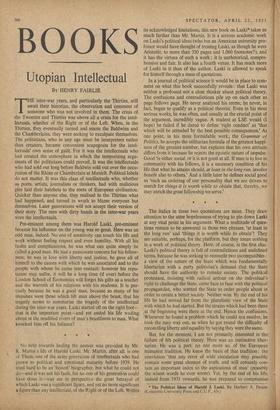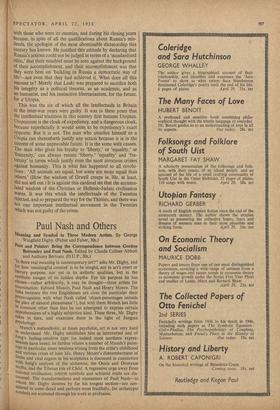Utopian Intellectual
BY HENRY FAIRLIE THE inter-war years, and particularly the Thirties, still await their historian, the observation and comment of someone who was not involved in them. The crisis of The Twenties and Thirties was above all a crisis for the intel- lectuals, whether of the Right or of the Left. When, in the Thirties, they eventually turned and smote the Baldwins and the Chamberlains, they were seeking to exculpate themselves. The politicians, who in any age must be interpreters rather than creators, became convenient scapegoats for the intel- lectuals' own sense of guilt. For it was the intellectuals who had created the atmosphere in which the temporising argu- ments of the politicians could prevail. It was the intellectuals who had sold out long before Baldwin sold out over the occu- pation of the Rhine or Chamberlain at Munich. Political labels do not matter. It was this class of intellectuals who, whether as poets. artists, journalists or thinkers, had with malicious glee laid their hatchets to the roots of European civilisation. Quicker than anyone else, they realised in the Thirties what had happened, and turned in wrath to blame everyone but themselves. Later generations will not accept their version of their story. The men with dirty hands in the inter-war years were the intellectuals.
Pre-eminent among them was Harold Laski, pre-eminent because his influence on the young was so great. Here was an odd man, indeed. No one of sensitivity can touch his life and work without feeling respect and even humility. With all his faults and complications, he was what can quite simply be called a good man. He had a passionate concern for his fellow- men; he was in love with liberty and justice; he gave all of himself to the causes with which he was associated and to the people with whom he came into contact; however his repu- tation may suffer, it will be a long time (if ever) before the London School of Economics will forget his gifts as a teacher and the warmth of his relations with his students. It is pre- cisely because he was a good man, because so many of his impulses were those which lift man above the beast, that his tragedy seems to summarise the tragedy of the intellectual during the inter-war years. Laski started off on the right foot— that is the important point—and yet ended his life wading about in the muddied rivers of man's beastliness to man. What knocked him off his balance? its acknowledged limitations, this new book on Laski* takes us much farther than Mr. Martin. It is a serious academic work on Laski's political ideas (who but an American university pro- fessor would have thought of treating Laski, as though he were Aristotle, to more than 350 pages and 1.060 footnotes?), and it has the virtues of such a work : it is unrhetorical, compre- hensive and fair. It also has a fourth virtue. It has much more of Laski in it than of the author. Laski is allowed to speak for himself through a mass of quotations.
In a journal of political science it would be in place to com- ment on what this book successfully reveals : that Laski was neither a profound nor a clear thinker about political theory. The confusions and contradictions pile up on each other as page follows page. He never analysed his terms; he never, in fact, began to qualify as a political theorist. Even in his most serious works, he was often, and usually at the crucial point of the argument, incredibly vague. A student at LSE would (I hope) be failed if he dared to define 'right conduct' as 'that which will be attended by the best possible consequences.' At one point, in his most formidable work, the Grammar of Politics, he accepts the utilitarian formula of the greatest happi- ness of the greatest number, but explains that his own attitude differs from it because he rejects the egoistic nature of impulse. Good 'is either social, or it is not good at all. If man is to live in community with his fellows, it is a necessary condition of his life that what he attains should, at least in the long run, involve benefit also to others.' And a little later he defines social good as 'such an ordering of our personality that we are driven to search for things it is worth while to obtain that, thereby. we may enrich the great fellowship we serve.'
* * * with those who were its enemies, and during his closing years became, in spite of all the qualifications about Russia's mis- deeds, the apologist of the most abominable dictatorship this century has known. He justified this attitude by declaring that Russia's actions could not be judged in terms of a 'standardised ethic.' that their mischief must be seen against the background of their accomplishment, and their accomplishment was that they were bent on 'building in Russia a democratic way of life'—not even that they had achieved it. What does all this amount to? Merely that Laski was prepared to sacrifice both his integrity as a political theorist, as an academic, and as an humanist, and his instinctive libertarianism, for the future, for a Utopia.
This was the sin of which all the intellectuals in Britain in the inter-war years were guilty. It was in these years that the intellectual tradition in this country first became Utopian. Utopianism is the cloak of expediency. and a dangerous cloak, because superficially it would seem to be expediency's exact Opposite. But it is not. The man who attaches himself to a Utopia can thenceforth justify any action because it is in the interest of some unprovable future. It is the same with causes. The man who gives his loyalty to 'liberty,' or 'equality.' or 'fraternity,' can always restate 'liberty,' equality' and `fra- ternity' in terms which justify even the most atrocious crimes against humanity. This is what has happened to all revolu- tions: 'All animals are equal, but some are more equal than others.' (How the wisdom of Orwell creeps in. 'He, at least, did not sell out.) It is against this cardinal sin that the accumu- lated wisdom of the Christian or Hellenic-Judaic civilisation Warns. It was this which the intellectuals of the Twenties rejected, and so prepared the way for the Thirties, and there was not one important intellectual movement in the Twenties Which was not guilty of the crime.











































 Previous page
Previous page